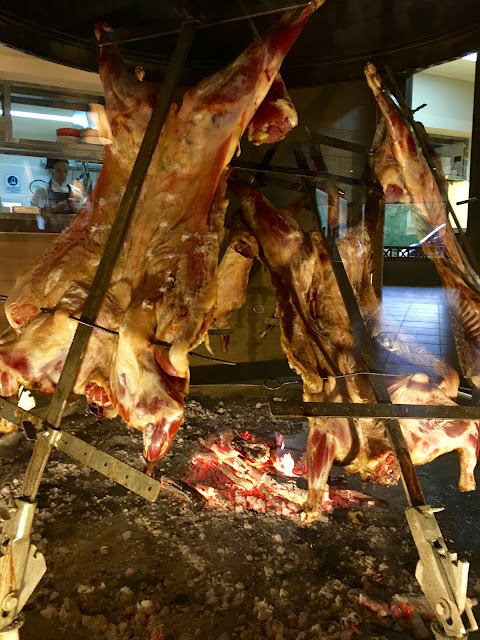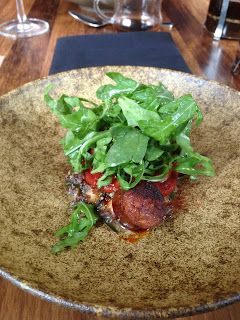We finally made it to Tarsan I Jane, billed as "Modern Valencian cuisine influenced by the Pacific Northwest", for their Sunday specialty paella. This is only served on Sunday lunch, requiring prepayment when making the reservations. Their menu:
As I don't drink coffee, I ordered tea instead,
The beet gazpacho, with citrus and yogurt foam, totally smooth, topped with smoked sea salt:
Next is seafood ceviche, with yellow tail tuna, a mussel, small potato chips (!,and you can see the chips on both sides of the front leaf), with avocado sauce, topped with some leaves (she told me what the leaves were, but I forgot; the menu says bay leaf, but I don't think so).
Then it sausage with egg and arugula. The sausage is fresh (as opposed to cured) chorizo, on a bed of chickpeas and quinoa, and an andoni egg. She explained that Andoni is the name of the chef who invented this egg technique, where the egg is cooked such as the white and yolk are the same consistency (sounds like sous vide).
Here is the chef, Mr Tarsin - real name is Perfecte Rocher - in front of the paella. The left and right pans are for 2 people, the center one is for 4.
I ordered an additional specialty item, the carabinero. which is according to there description:
"A large, deep-sea scarlet prawn. More distinct and robust in flavor than other shrimps or langoustine. They are also coveted for their large size. None of this prawn should go to waste as their heads are a delicacy"
I was told the way to eat it was to pull the head off, and suck the inside out. As soon as DH heard it, it became all mine. 😀 It was very messy, I had to wash my hands afterwards.
Here's the main attraction. The way to eat it is to use a spoon to scrape the bottom, holding on to the napkin covered handle while doing that, and eating off the pan itself. According to the write up in the Seattle times, the paella you get in Spain are usually sourced from the same kitchen(s), frozen and distributed to the different restaurants, hence they all taste similar, but theirs is made from scratch. Here is the write-up from the restaurant:
The combination of ingredients and cooking method determine the authenticity of the paella. Never will you see paella with shrimp, chorizo, piquillo peppers, and peas in Valencia, for those are not authentic paella ingredients. Authentic paella is a very thin layer of rice with very few "toppings" because the most important part is the rice itself. .. The favorite part is the umami crunch of the socarrat, the black crust that sticks to the bottom of the pan, also known as Valencian caviar.
We couldn't finish all the paella, and had to doggie bag the remainder.
For desert we had 2 (actually 3 since it was my Bday) - a chocolate based one, a citrus based one, and the last one has a touch of truffle oil in the rosemary vanilla sauce, which again made it all mine as DH cannot stand truffle.
Finally 2 chocolate truffles with house made gummy bears, served on a rock.
It was certainly a new concept and experience for us; the food was obviously made with love and care. Although I can't say fantastic - a large part of it was when we got to the paella I was kind of full - it was certainly good, albeit a little pricey. The left-over paella that I had for dinner tasted better than the fresh one - which meant that either it had time for the flavor to mellow, or that I was really too full to enjoy it at lunch. I do still have my eye on their dinner tasting menu,which we may attempt in the future.








































































